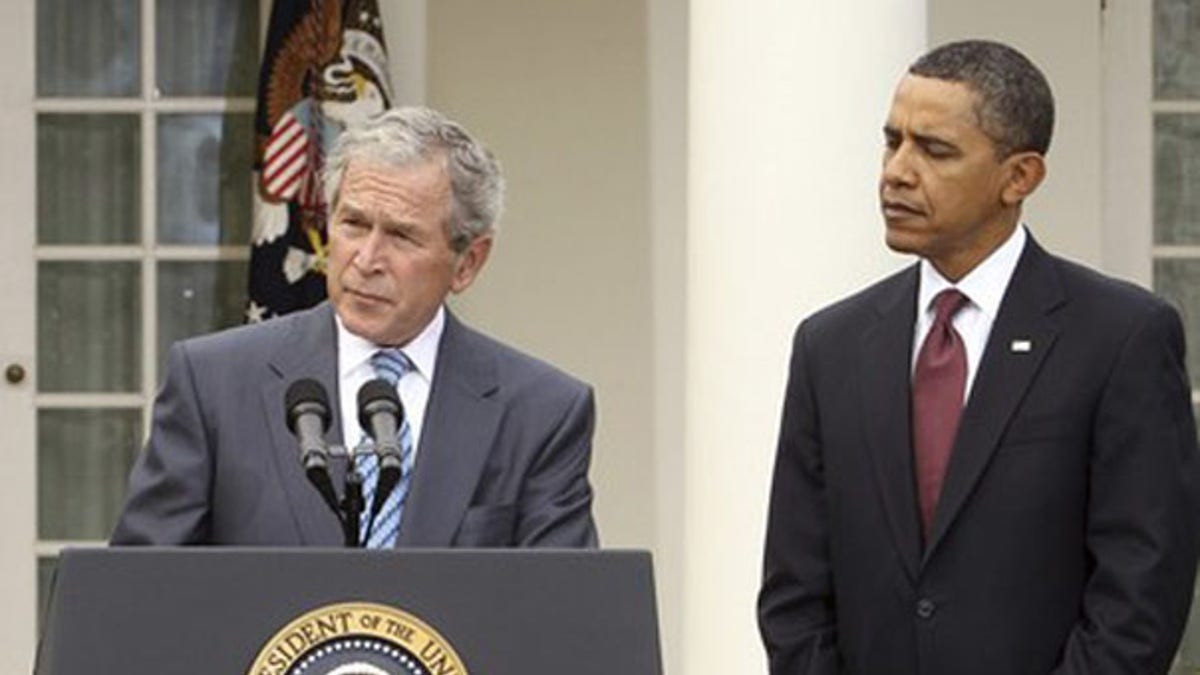
President Obama listens to former President George W. Bush in the Rose Garden of the White House Jan. 16. (Reuters Photo)
One year into his administration, President Obama might want to consider dropping the "blame Bush" page from his playbook.
Whether it's the economy, national security or America's reputation abroad, the president and his top advisers have been pinning the blame on the prior administration, directly or obliquely, ever since Obama's inauguration a full year ago. They've done so, in fact, at least seven times since last Tuesday's stunning upset in the Massachusetts Senate election.
While the loss of the late Ted Kennedy's longtime seat forced Democrats to acknowledge shortcomings in persuading Americans to support their health care reform plan, it didn't stop them from continuing to invoke the failings of the George W. Bush administration -- though Obama had just completed his first year in office.
Some Republicans, and even some Democrats, say it's time to choose a different strategy in selling and defending the Obama agenda, noting that the anti-Bush demographic just isn't as energized now as it was when Bush was in office.
"What you have the last two cycles is the angry voters, the ones most motivated to turn out, were Democrats, who did not like Bush. They didn't like his policies ... You saw it, what we call the surge voters," said former Rep. Tom Davis, former chairman of the National Republican Congressional Committee.
"Bush is gone now -- they're all asleep," Davis said.
But Obama appears to be trying to wake them up.
In the first presidential postmortem on the Massachusetts race last week, Obama invoked Bush right away in an interview with ABC News.
"The same thing that swept Scott Brown into office swept me into office," Obama said. "People are angry, and they're frustrated. Not just because of what's happened in the last year or two years, but what's happened over the last eight years."
He and his top staff referenced the Bush years later in the week as they unveiled new proposals for regulating Wall Street. White House Press Secretary Robert Gibbs on Thursday said the country can't go without stiff financial regulation, or else "we get into the same type of situation that we found ourselves in in September of 2008."
Obama, in a Saturday statement backing the creation of a deficit-tackling commission, referred to the "economic downturn we inherited," the "years of failing to pay for new policies," and the "trillions of dollars in deficits" the Bush administration created.
Those themes were bundled up on the Sunday morning talk shows when top advisers took to the airwaves with a coordinated Bush-centered message in discussing the administration's economic approach.
"What we inherited when we walked in the door was an economic situation that was far worse than anybody ever knew," Gibbs said on "Fox News Sunday." "The hole we inherit and the hole that we have to fill is very, very deep."
Senior Adviser David Axelrod, on CNN's State of the Union" and ABC News' "This Week," stressed the huge deficit Obama inherited from Bush.
"When the president walked in the door, he was handed the worst economic downturn since the Great Depression, a financial crisis that held out the prospect of the collapse of the financial system and a fiscal crisis," Axelrod said on "This Week." "President Clinton left a $237 billion surplus; President Obama received a $1.3 trillion deficit."
Obama contributed to that deficit with his $787 billion stimulus package and other programs, but his former campaign manager David Plouffe nevertheless urged his party not to "accept any lectures on spending" from the GOP.
Plouffe, who is signing on as a White House political adviser, wrote in a Washington Post column Sunday that "Republicans' fiscal irresponsibility has never been matched in our country's history."
But while the Bush administration did in fact turn a projected Clinton-era surplus into a deficit, Obama has not taken any major steps to rein in the spending. He signed pork-filled omnibus packages and is pursuing another jobs-creation bill.
Republican strategist Andrea Tantaros said Monday that Democrats should not "run against George Bush."
"This is about a very distracted, unfocused president," she said.
Politico.com reported that some Democratic strategists are also starting to reconsider that rhetorical tack -- given that efforts by Democrats to link their GOP opponents to Bush failed in the New Jersey and Virginia gubernatorial races, and the Massachusetts Senate race.
"What a stupid strategy that was," former Obama campaign aide Steve Hildebrand told Politico.com.




